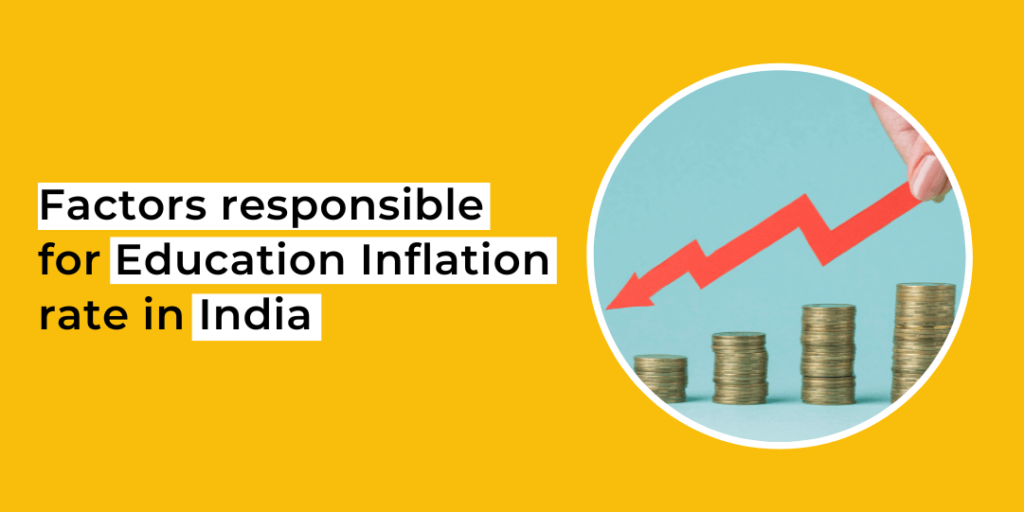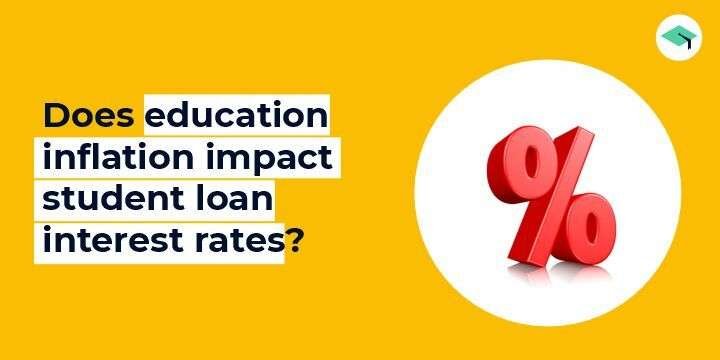How does inflation affect education?

Inflation is one of the root causes of price hikes in the education sector. The essential needs of students like uniforms, textbooks, tuition fees, school shoes, and transportation costs have become so expensive that it is slowly becoming impossible for a common man to afford his child’s education.
“How does inflation affect education?” is one of the common queries of every household all over the world. Although education is considered a child’s right, in reality, it is a luxury not all can afford.
Currently, the education inflation is at 10 – 12 percent and parents are finding it impossible to meet the growing fee structure and associated educational costs.
The above-normal rate makes it difficult for parents to educate their children at primary, secondary, and especially higher levels.
How does inflation affect education?
The impact of inflation on education can be understood with the help of the following parameters-
1. Daily essentials
Students have a limited budget, most of which, is spent on daily essentials like food, personal care, drinks, travel expenses, etc.
When a major chunk of money is already spent on essentials, it becomes difficult for them to meet education expenses, which are already skyrocketing.

The reason why education inflation is rising in India
2. Housing expenses
Do you think only daily essentials are major expenses? Think again.
Housing cost in every city is equally expensive. Students try to find the cheapest hostel or guest house where they can live as paying guests but the costs keep on adding to the total budget.
Inflation affects education as the priority of common people is to meet housing costs instead of educational expenses.
3. Health expenses
in order to live frugally and manage their expenses, many times, students do not have the money to eat three balanced meals, daily.
In the majority of cases, a hostel or PG Life does not provide good quality food and this harms their health. Thus, inflation increases health expenses and makes it difficult for students to meet their education costs easily.

Factors responsible for Education Inflation?
4. Standard of living
Inflation is dangerous as it directly impacts the standard of living.
The rise in the prices of goods decreases the purchasing power of the people. Something that cost 100 rupees a few months ago now costs 180 or 200 rs. This rise in price causes fewer goods and services to be purchased.
In such circumstances, the purchasing power gradually decreases, the value of goods increases, and ultimately the real value of the currency is at a loss.
Inflation thus decreases the standard of living, and parents belonging to lower and middle-income groups become unable to bear the cost of educating their children as the monthly allowance that they pay to their kids doesn’t make up for the price hikes.
5. Tuition fees
Private colleges charge inflated fees as they promise education, as well as, placement in good companies.
The tuition fees at such places are too high for an ordinary person and this is why it is believed that only rich people can afford to find entry into engineering, medicine, or another high-profile degree-course college.
But, this is not the case. Especially, if you have planned well for your child’s education in advance. The EduFund App helps you calculate the cost of your child’s education, plan, and then save for it, that too with the help of saving experts.
6. Price of textbooks
Students need textbooks to study but their prices keep on increasing year after year. The publishers blame the paper producers, who in turn, blame the increasing input costs for the price hike.
The impact of high textbook prices is harming the education industry as there is a gradual drop in the net enrolment rate (NER).
It is still affordable in India to some extent, especially for non-professional courses. However, if you are planning to send your child to a foreign country like the US, the books alone may charge you way over Rs 10 lakhs!

Does Education Inflation impact Student Loan interest rates?
7. Educational budgets
Inflation has a direct impact on education budgets and the salaries of school employees as authorities have to make cuts on various expenses.
The need for higher income encourages teachers and other support staff to look for temporary high-paying alternatives. This step ultimately harms the quality of education, more often than not in govt. schools.
8. Inefficient education savings
In India, it is very common for parents to save for their child’s education through FDs (Fixed Deposits).
Although this is a safe option, the return rates on FDs usually cannot keep up with the rate of education.
As a result, they eventually fail to help finance your child’s education.
9. Education loans
Children who want to pursue higher degree courses have to take educational loans. Inflation makes it difficult to repay these loans at the earliest opportunity.
Join our robust WhatsApp Community that helps parents invest!
Consider the educational loans on the EduFund App because it is available at low-interest rates and there are no hidden charges to hurt your pockets further.
FAQs
How does inflation impact education?
Inflation’s impact on education is profound. The CPI is currently at 5.4 percent for 2023-2024, education inflation is at 10 percent.
This means that the cost of education expenses is rapidly increasing and at a faster pace than CPI in the economy.
What is the meaning of education inflation?
Education inflation in India refers to the rising cost of education, including tuition fees, related expenses, and the overall financial burden on individuals and families seeking education.
This concept is similar to the more general term “inflation,” which refers to the increase in the prices of goods and services over time.
In the context of education in India, the term “education inflation” is often used to describe the trend of rapidly increasing costs associated with obtaining quality education, from primary school to higher education.
How can we keep up with the rising education costs?
The best way to keep up with rising education costs is to start investing early on. If you are planning a family and then investing in your child;’s school and college expenses should be on the top of your list.
You can start with a SIP in a good mutual fund and update your investments every year to beat high college fees. Another option is to consider US investments like stocks and ETFs.
Conclusion
Inflation is a global phenomenon, the impact of which, can be seen at every stage in a student’s life – from primary to higher education.
The burning issue of inflation hinders the growth of children as fewer parents can afford to send their children to schools, colleges, or universities.
By this time, you have understood how inflation affects education, but the primary concern remains – how can parents still defy inflation and save for their child’s education?
The experts associated with the EduFund App provide ample help in building a portfolio for your child’s education fund. It will consider the rising inflation and then chalk out a plan accordingly.
recommended reading
10 Benefits of Studying in Canada!
10 Reasons Why You Should Study in the USA
11 reasons to study in Australia
4 essential tips on investing in your child's education
4 Reasons why you should have an EduFund
5 Reasons why Global Education is the Best for Indian Students
5 reasons why your child's college education is at stake
5 steps to apply for art school admission
5 ways to deal with rising college fees for your child!














